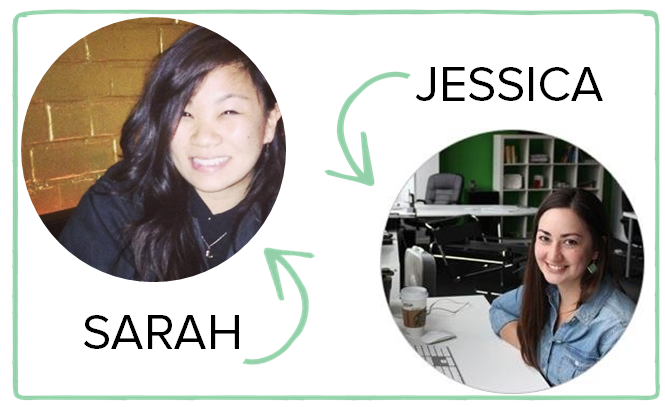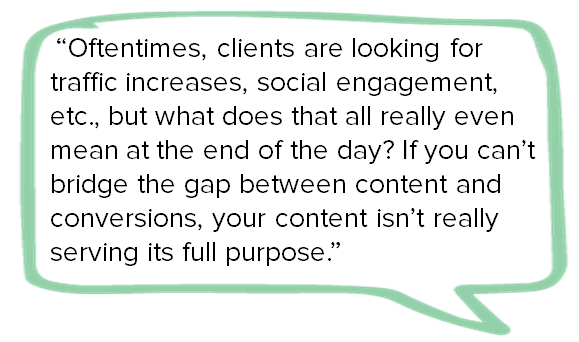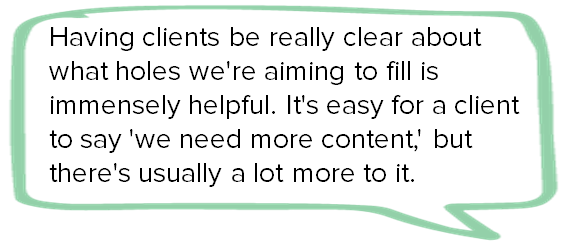When you’re starting a relationship with a content marketing agency, you want your new content providers to know your goals, understand your audience and fully realize your company’s intricacies. To reach that level of understanding – you need to think of your new content partners as an extension of your own marketing team – and to do this you have to be open to sharing what makes your company unique.
At Brafton, we begin our client relationships with a discovery period that can span up to six weeks. It’s during this time that our clients are filling out their new creative brief, our writers and designers are brainstorming topic pitches and outlines, and we’re getting to know our clients by participating in sales demos, visiting on-location and learning as much as we can about how they fit into their industries. As is with all of our strategies, each client kick off is unique.
To learn more about the Brafton kick-off process, we spoke with two content marketing strategists: San Francisco-based Sarah Chung and Chicago-based Jessica Kandler.

Here’s a look at 11 questions they ask at the start of every new partnership:
1. Why did you choose to work with us?
Jessica says: “Having clients be really clear about what holes we’re aiming to fill is immensely helpful. It’s easy for a client to say ‘we need more content,’ but there’s usually a lot more to it. Plus, if there’s some aspect of our company (such as our breadth of capabilities or our brand’s persona) that they specifically highlight, it can help uncover their expectations.”
2. Can you walk me through your sales cycle?
Jessica says: “This includes the basic process from lead to quote/sale, but is ideally broader – what are the peak times of year for sales? What are the low/high points attributed to? How do your marketing efforts differ during these times?”
3. Aside from standard metrics (percent increase in traffic, engagement, goal conversions, etc.) what are some other goals you have for content?
 Sarah says: “Oftentimes, clients are looking for traffic increases, social engagement, etc., but what does that all really even mean at the end of the day? If you can’t bridge the gap between content and conversions, your content isn’t really serving its full purpose. I like to use this question to talk about what types of content can support what goals in each stage of the sales funnel and also tee up the discussion for how UX plays a huge role in content consumption.”
Sarah says: “Oftentimes, clients are looking for traffic increases, social engagement, etc., but what does that all really even mean at the end of the day? If you can’t bridge the gap between content and conversions, your content isn’t really serving its full purpose. I like to use this question to talk about what types of content can support what goals in each stage of the sales funnel and also tee up the discussion for how UX plays a huge role in content consumption.”
4. What is the value of a new lead or sale to your business?
Jessica says “This helps clients monetize their goals, which makes it possible for us to show real ROI down the road.”
5. What is your budget?
Jessica says: “This is sometimes a sensitive topic to broach, but it’s vital. It helps me understand what their budget cycle is and uncover potential opportunities to enhance strategies with content that can really help them stand out. It also helps me to see how our services fit into the larger puzzle. If they’re spending a lot on PPC, we can factor that into our strategies.
6. How would you describe your company culture?
Sarah says: “This really helps us get the voice right. The questionnaire we send to all of our clients before we start writing for them outlines specific editorial styles and publications to mirror, but knowing what the culture is like gives us more room to SHOW instead of TELL with content.”
7. What are your strongest competitive differentiators as a business?
Sarah says: “Understanding what sets our clients apart allows us to shine a light on specific values, services and products they offer. But learning about competitive advantages also helps us advise on what types of content can best frame this message across specific channels.”
8. What are the main pain points/needs of your clients?
 Jessica says: “I like to get into this in terms of rational vs. emotional needs. It’s super easy to say, for example, ‘my customers need to buy my software because they don’t have the internal capacity to do what my software does for them’ (rational need). But what else motivates the customers to take action – is it a desire to look good to their bosses by being more productive? Is it that your brand and mission appeals to theirs?”
Jessica says: “I like to get into this in terms of rational vs. emotional needs. It’s super easy to say, for example, ‘my customers need to buy my software because they don’t have the internal capacity to do what my software does for them’ (rational need). But what else motivates the customers to take action – is it a desire to look good to their bosses by being more productive? Is it that your brand and mission appeals to theirs?”
9. What kind of reaction do you want your audience to have after reading content?
Sarah says: “If the content is doing its job, it should get your audience to react in the way you want them to, which is hopefully to take action (downloading something, completing an online form, contacting you, etc.). It puts the power of content into perspective and shows that it isn’t just used for the sake of SEO and driving traffic, but that it can effectively serve a variety of marketing objectives.”
10. Are there any examples of content you DON’T like?
Sarah says: “Typically, it’s easier to pinpoint what you are not a fan of versus what you do like to read or what you feel neutral about.”
11. What types of events does your business participate in (if any) throughout the year? (Like industry events, trade shows, charity events, etc.)
Sarah says: “I like to get information on this, especially if the client isn’t receiving infographics or videos. Events are a great way to showcase visual content to communicate a variety of different messages.”
If your content marketing services partner isn’t asking questions like this, you run the risk of having a rocky relationship. As a company with deep editorial roots, we understand how subjective writing can be – especially when it’s shaping the first impression customers have of your brand. We ask a lot of questions to get to know you, so we can execute the strategies that will help you reach your online goals.





